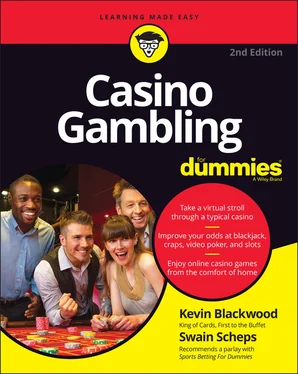 If it’s not clear to you by now, this book is not your go-to source for every possible scenario of how your gambling affects your tax return. Just know that losses are not as straightforward as winnings. Did you win money gambling? It’s subject to income tax. Did you have some losses, too? You can deduct those from your winnings if you itemize your deductions. The bad news is, if you’re taking the standard deduction, you can’t subtract losses from winnings. And to add insult to injury, if you had a losing year, the amount of losses you can deduct can’t exceed the amount you won.
If it’s not clear to you by now, this book is not your go-to source for every possible scenario of how your gambling affects your tax return. Just know that losses are not as straightforward as winnings. Did you win money gambling? It’s subject to income tax. Did you have some losses, too? You can deduct those from your winnings if you itemize your deductions. The bad news is, if you’re taking the standard deduction, you can’t subtract losses from winnings. And to add insult to injury, if you had a losing year, the amount of losses you can deduct can’t exceed the amount you won.
For example, say you had winnings of $4,300 for the year and losses of $5,000. You may assume that the higher losses cancel out the win, so you don’t owe any tax. But when your total deductions (including your gambling losses of $5,000) are less than the standard deduction (for a married couple filing jointly, that’s $25,100), you can’t take any of those losses on your return because you aren’t itemizing. Unfortunately, you still must pay taxes on your winnings, even though you actually lost. Confused? Welcome to the crazy world of the tax code.
Unreported winnings: Don’t fool the IRS
It’s a known fact that casinos typically report some activity to the IRS — but not all. In almost every setting, the house alerts the IRS with a Currency Transaction Report by Casinos (CTRC) when a player buys in or cashes out for $10,000 or more in one day. The same is true if you make a $10,000 bet on a horse or a sporting event.
 Don’t waste your time begging casino employees not to fill out tax forms on you (either a CTRC or a W-2G). U.S. laws require these forms, and trying to avoid them can land you in hot water. Casinos send the W-2G to Uncle Sam, and you get a copy at the end of the year. Make sure you include a copy when you file your return.
Don’t waste your time begging casino employees not to fill out tax forms on you (either a CTRC or a W-2G). U.S. laws require these forms, and trying to avoid them can land you in hot water. Casinos send the W-2G to Uncle Sam, and you get a copy at the end of the year. Make sure you include a copy when you file your return.
Hopeful gamblers may believe they only have to pay taxes on winnings that the casino reports to the IRS. Not true. All gambling winnings are subject to taxation, whether they come from a foreign country, the Internet, your neighbor’s poker game, a church bingo night, or a casino. Many players ignore this law, however, figuring Big Brother won’t find out about their small wins.
 The IRS can conceivably obtain records from your favorite casino to determine your yearly win or loss, although I’m not aware of any such cases. But remember this principle: Underpaying your taxes is a crime. So, even if your chance of getting caught is small, it’s not worth the gamble.
The IRS can conceivably obtain records from your favorite casino to determine your yearly win or loss, although I’m not aware of any such cases. But remember this principle: Underpaying your taxes is a crime. So, even if your chance of getting caught is small, it’s not worth the gamble.
Counting comps for tax purposes
Comps (the free perks that casinos give to gamblers) pose a gray area in tax reporting. Technically, casino comps are income, but the government is likely to care only when you receive substantial gifts or luxury merchandise, such as an expensive watch or a new speedboat.
Few gamblers lose enough money to have casinos ship them a luxury car for Christmas. Most comps are soft — meaning the casino doesn’t incur a hard cost for them. Examples of soft costs are hotel accommodations or the dinner buffet. (Check out Chapter 20for ways to score comps.)
Lowering your gambling tax
For most recreational gamblers, there aren’t many ways to reduce taxes on winnings. If gambling is a hobby, which is true 99.9 percent of the time, then you can’t deduct any expenses — only your losses. Professional gamblers can deduct expenses, but a rigid list of requirements prevents all but a handful of diehards from qualifying as professional gamblers.
 The only tax-reducing tool for recreational players is a log of gambling activity (see the next section for what you need to record). Because you can only deduct substantiated losses, you must be able to verify your losses in order to offset your wins.
The only tax-reducing tool for recreational players is a log of gambling activity (see the next section for what you need to record). Because you can only deduct substantiated losses, you must be able to verify your losses in order to offset your wins.
Keeping a log may seem unnecessary for people who expect to show a net loss for the year. However, one of the appeals of gambling is that the unexpected can happen. For example, you take four trips a year to Vegas and play dollar slot machines. The first three trips are losers and leave you $2,200 in the hole. However, on the last hour of the last day of your last trip, you line up three diamonds and win $2,000.
In this scenario, the IRS assumes you won at least $2,000 for the year because they received notice of this $2,000 win from the casino in the W-2G form. If you can’t document those losses, you can’t offset the $2000 win and will have to pay income tax on it. You not only added insult to injury, you’ve possibly added insolvency as well.
The IRS addresses the issue of proper record-keeping and documentation for gamblers. The basic requirements include
Date and type of gambling event (poker, blackjack, and so on)
Name and location of casino, racetrack, or gambling venue
Table or slot machine number where gambling took place
Who you were with when gambling
Total dollar amount you won or lost
 If you neglected to track these details, you’re permitted to use airline tickets, canceled checks, bank withdrawals, credit card cash advances, losing betting stubs, or yearly statements of your win/loss from the casino as additional collaboration. The burden of proof rests on you, the taxpayer, so the better your records, the better your chances of surviving an audit.
If you neglected to track these details, you’re permitted to use airline tickets, canceled checks, bank withdrawals, credit card cash advances, losing betting stubs, or yearly statements of your win/loss from the casino as additional collaboration. The burden of proof rests on you, the taxpayer, so the better your records, the better your chances of surviving an audit.
Wagering with a group: Who pays the tax?
An old joke goes like this: Woody takes his yearly trip to Las Vegas. His friend, Dave, gives Woody $500 and tells him to bet it all on lucky number 22 at the roulette wheel. Woody dutifully takes the money and, upon arriving in Sin City, he goes straight to the wheel and plunks $500 down on Number 22. Amazingly, Number 22 hits, and Woody wins $17,500. After raking in all the chips, Woody says, “Wow, that sure was a lucky number. Now I guess I’d better make the $500 bet on Number 22 for Dave.”
If you’re not as ethically challenged as Woody, you at least split the winnings with your fortunate pal. And the word from the IRS is that you can share the tax obligation as well. Form 5754 covers those situations and alerts the IRS that more than one person actually won the prize.
Part 2
Conquering the Table Games
IN THIS PART …
Get the lowdown on casino etiquette.
Master key poker tactics and learn about the most popular poker games.
Hone your blackjack skills and take advantage of its low house advantage.
Learn how to shoot dice in a pulse-pounding game of craps.
Take a spin on the roulette wheel and learn help strategies to stretch your bankroll.
Demystify baccarat and learn that it’s not just for high-rollers.
Конец ознакомительного фрагмента.
Текст предоставлен ООО «ЛитРес».
Прочитайте эту книгу целиком, купив полную легальную версию на ЛитРес.
Читать дальше

 If it’s not clear to you by now, this book is not your go-to source for every possible scenario of how your gambling affects your tax return. Just know that losses are not as straightforward as winnings. Did you win money gambling? It’s subject to income tax. Did you have some losses, too? You can deduct those from your winnings if you itemize your deductions. The bad news is, if you’re taking the standard deduction, you can’t subtract losses from winnings. And to add insult to injury, if you had a losing year, the amount of losses you can deduct can’t exceed the amount you won.
If it’s not clear to you by now, this book is not your go-to source for every possible scenario of how your gambling affects your tax return. Just know that losses are not as straightforward as winnings. Did you win money gambling? It’s subject to income tax. Did you have some losses, too? You can deduct those from your winnings if you itemize your deductions. The bad news is, if you’re taking the standard deduction, you can’t subtract losses from winnings. And to add insult to injury, if you had a losing year, the amount of losses you can deduct can’t exceed the amount you won. The IRS can conceivably obtain records from your favorite casino to determine your yearly win or loss, although I’m not aware of any such cases. But remember this principle: Underpaying your taxes is a crime. So, even if your chance of getting caught is small, it’s not worth the gamble.
The IRS can conceivably obtain records from your favorite casino to determine your yearly win or loss, although I’m not aware of any such cases. But remember this principle: Underpaying your taxes is a crime. So, even if your chance of getting caught is small, it’s not worth the gamble. The only tax-reducing tool for recreational players is a log of gambling activity (see the next section for what you need to record). Because you can only deduct substantiated losses, you must be able to verify your losses in order to offset your wins.
The only tax-reducing tool for recreational players is a log of gambling activity (see the next section for what you need to record). Because you can only deduct substantiated losses, you must be able to verify your losses in order to offset your wins.










